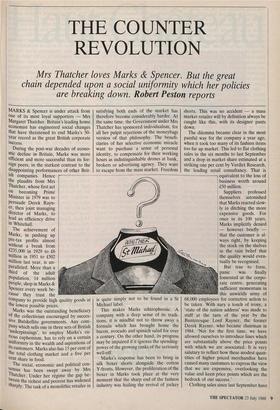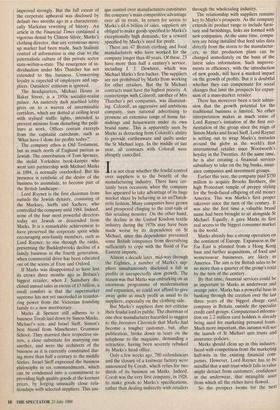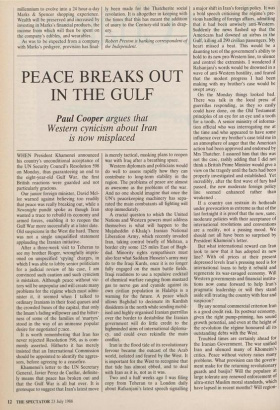THE COUNTER REVOLUTION
Mrs Thatcher loves Marks & Spencer. But the great chain depended upon a social uniformity which her policies
MARKS & Spencer is under attack from one of its most loyal supporters — Mrs Margaret Thatcher. Britain's leading home economist has engineered social changes that have threatened to end Marks's 50- year record as the great British corporate success.
The achievement of Marks, in pushing up pre-tax profits almost without a break from £235,000 in 1929 to £6 million in 1951 to £502 million last year, is un- paralleled. More than a third of the adult Population, 14 million people, shop in Marks & Spencer every week be- cause they trust the satisfying both ends of the market has therefore become considerably harder. At the same time, the Government under Mrs Thatcher has sponsored individualism, for all her pulpit rejections of the moneybags version of that philosophy. The benefi- ciaries of her selective economic miracle want to purchase a sense of personal identity, to compensate for their working hours as indistinguishable drones at bank, brokers or advertising agency. They want to escape from the mass market. Freedom co - mpany to provide high quality goods at the lowest possible prices. Marks was the outstanding beneficiary of the collectivism encouraged by succes- sive Butskellite governments. Any com- pany which sells one in three sets of British `underpinnings', to employ Marks's cu- rious euphemism, has to rely on a certain uniformity in the wealth and aspirations of its customers. Marks also has 15 per cent of the total clothing market and a five per cent share in food.
The social, economic and political con- sensus has been swept away by Mrs Thatcher. Under her regime the gap be- tween the richest and poorest has widened sharply. The task of a monolithic retailer in is quite simply not to be found in a St Michael label.
This makes Marks schizophrenic. A company with a deep sense of its tradi- tions, it is mindful not to throw away a formula which has brought home the bacon, avocado and spinach salad for over a century. On the other hand, its progress may be impaired if it ignores the spending- power of the growing ranks of the seriously well-off.
Marks's response has been to bring in silk boxer shorts alongside the cotton Y-fronts. However, the proliferation of the boxer in Marks took place at the very moment that the sharp end of the fashion industry was hailing the revival of jockey shorts. This was no accident — a mass market retailer will by definition always be caught like this, with its designer pants down.
The dilemma became clear in the most painful way for the company a year ago, when it took too many of its fashion items too far up market. This led to flat clothing sales in the six months to last September and a drop in market share estimated at a striking one per cent by Verdict Research, the leading retail consultancy. That is equivalent to the loss of business worth around £50 million.
Suppliers professed themselves astonished that Marks reacted slo*- ly in ditching the more expensive goods. For once in its 100 years, Marks implicitly denied — however briefly that the customer is al- ways right, by keeping the stock on the shelves in the vain belief that the quality would even- tually be recognised.
But true to form, panic was finally fomented at the corpo- rate centre, generating sufficient momentum in this unwieldy army of 68,000 employees for corrective action to be taken. With nary a touch of irony, a `state of the nation address' was made to staff at the turn of the year by the Bunteresque Lord Rayner, the former Derek Rayner, who became chairman in 1984. `Not for the first time, we have allowed ourselves to introduce lines which are substantially above the price points with which we are associated. It is very salutary to reflect how these modest quan- tities of higher priced merchandise have caused many customers to express the view that we are expensive, overlooking the value and keen price points which are the bedrock of our success.'
Clothing sales since last September have improved strongly. But the full extent of the corporate upheaval was disclosed by default two months ago in a characteristi- cally Marksian rewriting of history. An article in the Financial Times contained a vigorous denial by Clinton Silver, Marks's clothing director, that any erroneous move up market had been made. Such Stalinist control of information is one clue to the paternalistic culture of this private sector state-within-a-state. The resurgence of in- dividualism under Mrs Thatcher has not extended to this business. Unswerving loyalty is expected of employees and sup- pliers. Outsiders' criticism is ignored.
The headquarters, Michael House in Baker Street, is a 1950s socialist-realist palace. An austerely dark marbled lobby gives on to a warren of interminable corridors, which are dotted at ceiling level with stylised traffic lights, intended to prevent minions from disturbing the polit- buro at work. Offices contain excerpts from the capitalist catechism, such as What have I done for profits today?'
The company ethos is Old Testament, but as much north of England puritan as Jewish. The contribution of Tom Spencer, the stolid Yorkshire book-keeper who went into partnership with Michael Marks in 1894, is normally overlooked. But his presence is symbolic of the desire of the business to assimilate, to become part of the British landscape.
Lord Rayner is the first chairman from outside the Jewish dynasty, consisting of the Markses, Sieffs and Sachers, who controlled the company until 1984. Indeed, none of the four most powerful directors today are Jewish or descended from Marks. It is a remarkable achievement to have preserved the corporate spirit while encouraging non-family members, such as Lord Rayner, to rise through the ranks, preventing the Buddenbrooks decline of a family business in the fourth generation, when commercial drive has been educated out of the scions at Eton and Oxford.
If Marks was disappointed to have lost its crown three months ago as Britain's biggest retailer, when J. Sainsbury dis- closed annual sales in excess of £5 billion, a small comfort is that the supermarket supremo has not yet succeeded in transfer- ring power from the Victorian founding family to a new meritocracy.
Marks & Spencer still adheres to a business Torah laid down by Simon Marks, Michael's son, and Israel Sieff, Simon's best friend from Manchester Grammar School. They married their respective sis- ters, a close substitute for marrying one another, and were the architects of the business as it is currently constituted dur- ing more than half a century to the middle Sixties. Israel Sieff expressed the business philosophy in six commandments, which can be condensed into a commitment to providing high quality goods at the keenest prices, by forging unusually close rela- tionships with selected suppliers. This uni- clue control over manufacturers constitutes the company's main competitive advantage over all its rivals. In return for access to Marks's £4.6 billion of sales, suppliers are obliged to make goods specified to Marks's exceptionally high demands, for a reward specified by Marks's need for profit.
There are 47 British clothing and food manufacturers who have worked for the company longer than 40 years. Of these, 23 have more than half a century's service, including I. J. Dewhirst, which was Michael Marks's first backer. The suppliers are not prohibited by Marks from working for other retailers. But the St Michael contracts must have the highest priority. A contretemps with Coloroll, another of Mrs Thatcher's pet companies, was illuminat- ing. Coloroll, an aggressive and ambitious company, uses national advertising to promote an extensive range of home fur- nishings and housewares under its own brand name. This is apparently seen by Marks as detracting from Coloroll's ability to provide earthenware and quilts under the St Michael logo. In the middle of last year, all contracts with Coloroll were abruptly cancelled.
it is not clear whether the feudal control over suppliers is to the benefit of the manufacturing industry. There have cer- tainly been occasions when the company has appeared to take advantage of its huge market share by behaving in an unThatch- erite fashion. Many companies have grown and prospered clinging to the coat-tails of this retailing monster. On the other hand, the decline in the United Kindom textile industry during the 1970s may have been made worse by its dependence on St Michael, since this dependence prevented some British companies from diversifying sufficiently to cope with the flood of Far Eastern imports.
Almost a decade later, mid-way through the Eighties, a number of Marks's sup- pliers simultaneously disclosed a fall in profits or unexpectedly slow growth. The reason was that Marks was embarking on an enormous programme of modernisation and expansion, so could not afford to give away quite as much profit as usual to its suppliers, especially on the clothing side.
But Marks's suppliers dare not criticise their feudal lord in public. The chairman of one shoe manufacturer hazarded to suggest to the Investors Chronicle that Marks had become a tougher customer, but, after publication, broke down in 'tears on the telephone to the magazine, demanding a retraction, having been severely rebuked by Marks's head office.
Only a few weeks ago, 780 redundancies and the closure of a knitwear factory were announced by Corah, which relies for two thirds of its business on Marks. Indeed, Corah was the very first company, in 1928, to make goods to Marks's specifications, rather than dealing indirectly with retailers through the wholesaling industry.
The relationship with suppliers remains key to Marks's prospects. As the company extends its product range to include furni- ture and furnishings, links are formed with new companies. At the same time, compu- ters are being installed that feed sales data directly from the stores to the manufactur- ers, so that production plans can be changed immediately on the basis of the latest sales information. Such improve- ments in efficiency, with the introduction of new goods, will have a marked impact on the growth of profits. But it is doubtful whether they can compensate for social changes that limit the prospects for expan- sion of a mass-market retailer.
There has moreover been a tacit admis- sion that the growth potential for the traditional business is limited. No other interpretation makes as much sense of Lord Rayner's initiation of the first reo- rientation of the group since the reign of Simon Marks and Israel Sieff. Lord Rayner is setting out to wrap Marks's tentacles around the globe as the world's first international retailer since Woolworth's heyday in the Twenties. At the same time, he is also creating a financial services subsidiary to take on the big banks, insur- ance companies and investment groups.
Earlier this year, the company paid $750 million to acquire Brooks Brothers, the high Protestant temple of preppy styling for the fresh-faced offspring of old money America. This was Marks's first proper takeover since the turn of the century. It was also the first time a valuable brand name had been brought to sit alongside St Michael. Equally, it gave Marks its first real access to the biggest consumer market in the world.
Marks already has a strong operation on the continent of Europe. Expansion in the Far East is planned from a Hong Kong base and further acquisitions, of food and womenswear businesses, are likely in America. The aim is for British sales to be no more than a quarter of the group's total by the turn of the century.
By that time, financial services could be as important to Marks as underwear and orange juice. Marks has a powerful base in banking through the creation over the last three years of the biggest charge card company in Britain, outside the specialist credit card groups. Computerised informa- tion on 2.2 million card holders is already being used for marketing personal loans. Much more important, this autumn will see the launch of St Michael unit trusts and insurance policies.
Marks should clean up in this industry, faced with competition from the marketing half-wits in the existing financial com- panies. However, Lord Rayner has to be mindful that a unit trust which falls in value might detract from customers' confidence in the underwear, that intangible asset from which all the riches have flowed.
So the prospect looms for the next millennium to evolve into a 24 hour-a-day Marks & Spencer shopping experience. Wealth will be preserved and increased by investing in Marks's financial products, the income from which will then be spent on the company's edibles, and wearables.
As was to be expected from a company with Marks's pedigree, provision has final- ly been made for the Thatcherite social revolution. It is altogether in keeping with the times that this has meant the addition of usury to the Century-old trade in drap- ery.
Robert Preston is banking correspondent of the Independent.
















































 Previous page
Previous page